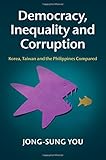Democracy, inequality and corruption : Korea, Taiwan and the Philippines compared / Jong-Sung You.
Material type: TextPublication details: Cambridge : Cambridge university press, 2015.Description: xiii, 293 pages : illustrations ; 24 cmISBN:
TextPublication details: Cambridge : Cambridge university press, 2015.Description: xiii, 293 pages : illustrations ; 24 cmISBN: - 9781107078406
- 364.1323 23 Y67
| Item type | Current library | Call number | Status | Date due | Barcode | Item holds | |
|---|---|---|---|---|---|---|---|
| Books | ISI Library, Kolkata | 364.1323 Y67 (Browse shelf(Opens below)) | Available | 137846 |
Browsing ISI Library, Kolkata shelves Close shelf browser (Hides shelf browser)
| No cover image available |

|
No cover image available |

|

|

|

|
||
| 364.1323 K92 Eradicate corruption and save the nation | 364.1323 M678 Economics of corruption | 364.1323 N398 Public corruption | 364.1323 Y67 Democracy, inequality and corruption : | 364.1323095484 P337 Interpreting corruption | 364.135 K29 Illicit trafficking | 364.15 Sa268 Measuring human trafficking |
Includes bibliographical references and index.
1. Introduction : the puzzles, arguments and methodology --
2. Democracy, inequality and corruption : theory and hypotheses --
3. Corruption in Korea, Taiwan and the Philippines : relative levels, trends and possible explanations --
4. The genesis of inequality, land reforms and path dependence --
5. Elections, clientelism and political corruption --
6. Bureaucracy, patronage and bureaucratic corruption --
7. Industrial policy, capture and corporate corruption --
8. Cross-national evidence for generalizability --
9. Conclusion.
In this comparative, historical survey of three East-Asian democracies, Jong-sung You explores the correlation between inequality and corruption in the countries of South Korea, Taiwan and the Philippines. Drawing on a wealth of rich empirical research, he illustrates the ways in which economic inequality can undermine democratic accountability, thereby increasing the risk of clientelism and capture. Transcending the scope of corruption research beyond economic growth, this book surveys why some countries, like the Philippines, have failed to curb corruption and develop, whilst others such as South Korea and Taiwan have been more successful. Taking into account factors such as the success and failure of land reform, variations in social structure, and industrial policy, Jong-sung You provides a sound example of how comparative analysis can be employed to identify causal direction and mechanisms in political science.
There are no comments on this title.



























